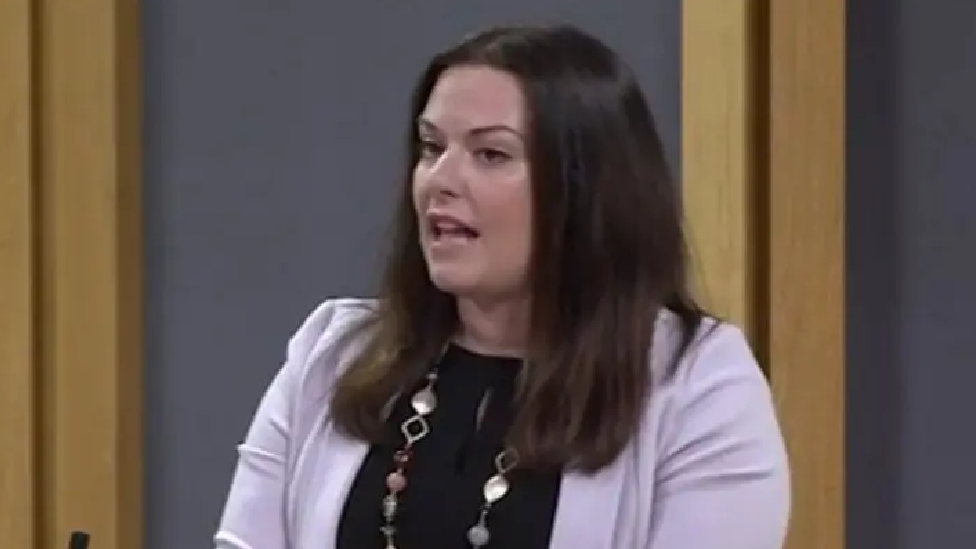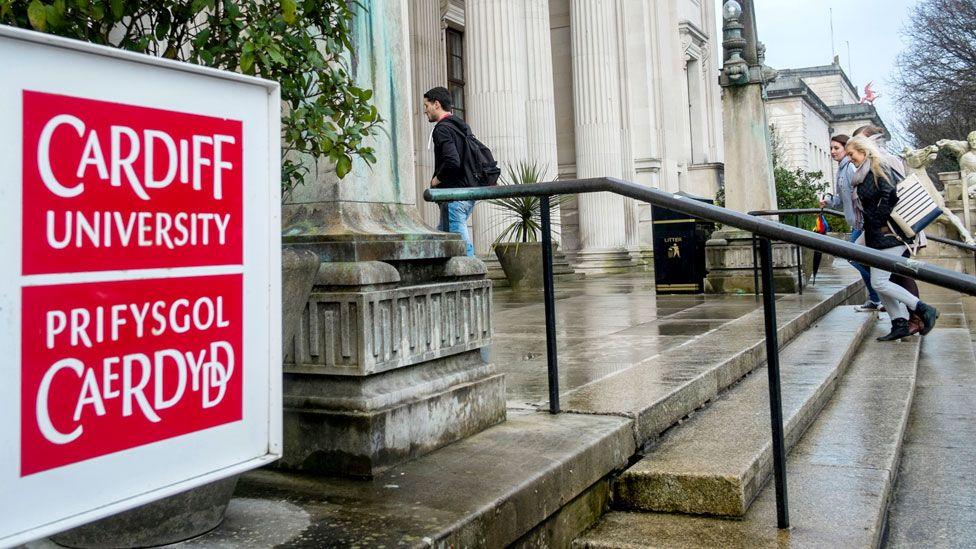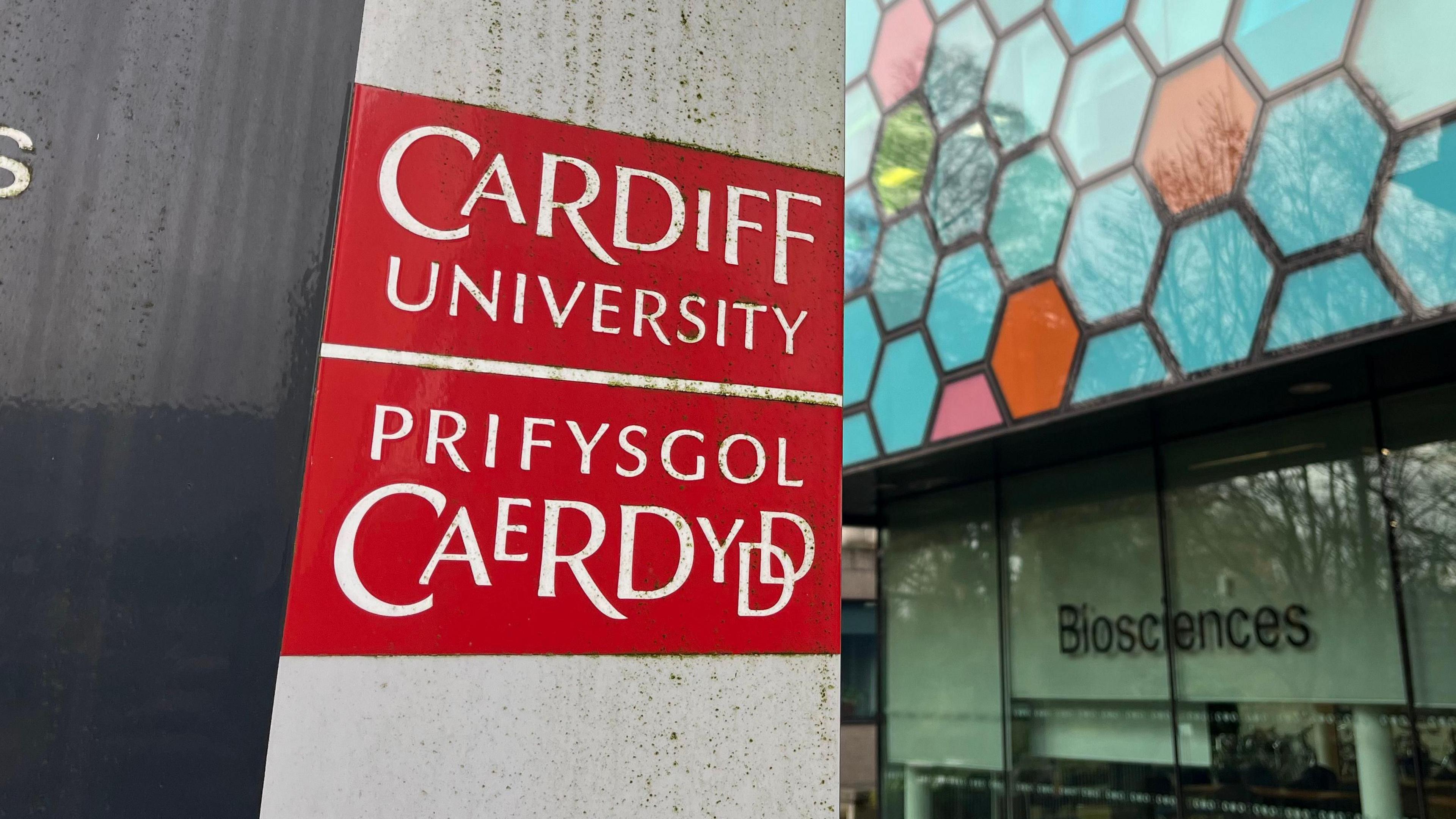Bangor University to cut 200 jobs amid £15m savings

Bangor University could see 200 jobs cut, its vice-chancellor has told staff
- Published
Bangor University aims to cut about 200 jobs to make savings of £15m, its vice-chancellor told staff in an email.
Vice-Chancellor Edmund Burke said the drop in international students, a rise in costs and the UK government's changes to national insurance had left them needing to make "unprecedented" changes.
Meanwhile, the University of South Wales (USW) also announced on Wednesday it plans to cut 90 jobs.
The UK government has been asked to comment.
'Land of song silenced if university axes arts'
- Published1 February
Less than a third of 18-year-olds apply for uni
- Published16 February
Call for major review of Welsh higher education
- Published13 February
It comes as multiple universities across the UK have said they are in financial crisis and have to make job losses, with Cardiff University planning to cut 400 jobs.
Bangor University has about 10,000 students and was thought to have about 650 academic staff members, though the voluntary redundancy scheme will be offered to non-academic staff too.
The vice-chancellor said the university aimed to extend the voluntary redundancy scheme which is live at the moment, but compulsory redundancies might be needed.
"These sector level challenges are very significant for us," Prof Burke said.
"In autumn 2024, our student intakes were smaller than in 2023, falling short of our budget target. Our home undergraduate intake was 7% smaller and, without medicine, was down 11%.
"Our international intake was also smaller, with our September international postgraduate intake around half the size of the 2023 intake."
Staff were invited to a meeting with university bosses on Wednesday afternoon to discuss the proposed changes and had a chance to voice concerns.
Fewer international students
Prof Burke said in the email that though universities are able to increase fees for incoming students to £9,535 from 2025/26 onwards, "there is no agreement for future inflation adjustment to the amount of money we receive per student".
He added: "UK universities have been increasingly reliant on international income to make up for the shortfall from home fees not increasing by inflation.
"The UK government's action to reduce the level of immigration has led to a fall in international students coming to study in the UK."
He said the new UK government did not seem to be planning to reverse these changes.
Adding to the pressure, Prof Burke added: "Some high-tariff universities appear to have responded to the fall in international student intakes by reducing their entry grades and taking more home students. This has reduced the size of the pool of students coming to other universities."
To cut costs, the vice-chancellor said the university had already moved staff out of some buildings and these were to be sold.
"While we must make some difficult decisions, I believe that by successfully implementing our plans, we will restore the university to a stable and sustainable position," he said.

Sion studies music at Bangor University and worries the music department, like the one at Cardiff, will be threatened with closure
Sion, studies music at Bangor University and said hearing the announcement has scared him.
He worries the music department will be threatened with closure like the one in Cardiff, which would "not look good" for him as a music student.
"I hope we will stay open but it will be touch and go. I think the arts will suffer more than STEM [science, technology, engineering and maths] subjects."
Another student worried about the news is Beth, who studies primary education, she said that fewer staff meant less support, which would have a big impact on smaller courses.
She said: "I think its very sad, it will have a big impact on us as students."
The news comes as the University of South Wales also announced on Wednesday it will be cutting 90 jobs.
The university said: "The University of South Wales is not exempt from the financial challenges facing the wider higher education sector."
It said several courses will be closed "after all current students have completed their studies" and it will withdraw from some research topics to focus on areas of "crime, security and justice; health and wellbeing; sustainable environment; and creative innovation".
It said it will "look to limit compulsory redundancies" and will offer voluntary redundancies.
The university said it will ensure "students, colleagues and partners are fully supported throughout this challenging process".
Cardiff University, meanwhile, has written to 1,800 academic staff at risk of being part of the 400 job losses previously announced.
The university hopes to achieve as much of the cuts as possible through voluntary redundancies.

Cynon Valley MS, Vikki Howells, announced on Tuesday a further £19m for the higher education sector but critics argue it is not enough
On Tuesday the minister responsible for higher education in Wales asked universities to "consider all options", including using its financial reserves, to prevent job losses.
Vikki Howells, the Welsh government's minister in charge, announced on Tuesday a further £19m for the higher education sector, despite stating earlier this month that no extra money was available.
In the Senedd on Wednesday, Plaid Cymru MS Luke Fletcher called on Ms Howells to show leadership following proposals for job cuts at both Bangor University and Cardiff University.
Ms Howells said that the news of job losses at Bangor had been "leaked to the media" and declined to comment on specific issues at either university, stating that neither had made a formal announcement yet.
She added that she would meet with university vice-chancellors the week after recess, saying: "However, that doesn't mean that work isn't already ongoing."
She promised to discuss the issues in more detail once a formal announcement was made.
Meanwhile, Welsh Conservative MS Andrew RT Davies raised concerns about Cardiff University's inability to discuss measures with other institutions on how to protect courses and jobs due to regulations set by the Competition and Markets Authority (CMA)., external
Ms Howells assured Mr Davies that the CMA was working to "clarify these issues across the UK".
A Welsh government spokesperson said: "We understand the concerns surrounding the higher education sector and the effect this will have on the staff and learners at these institutions."
It added that work was already underway including new legislation, the creation of Medr, the body that funds and regulates universities in Wales, and the allocation of £18.5m in additional funding to help universities reduce operating costs.
- Published28 January

- Published2 February
